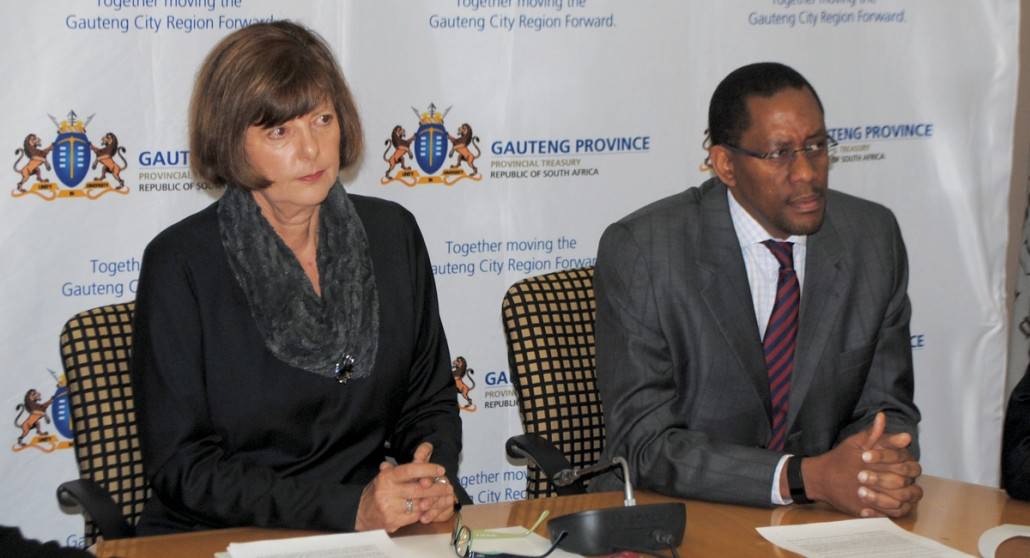The Gauteng provincial government (GPG) today announced that First National Bank will be the GPG’s banking supplier for the next five years. The tender for banking services, together with that of the Cedar Road upgrade, comprised the pilot phase of the GPG’s Open Tender project.
With the award of the banking tender, the pilot phase has now ended, as awarding of the Cedar Road tender took place in April.
First National Bank (FNB), which scored the highest points of the four bidders, will manage, among others, the payment of salaries of 200 000 public officials and supplier payments to the tune of more than R3-billion per month. The provincial budget is expected to increase from R95.3-billion in the 2015/16 financial year, to R103-billion in the 2017/18 financial year.
FNB is the current tender holder, but its five-year contract expires in March 2016.
“The open tender route ensures that transparency is top of mind throughout the process,” said Danny Zandamela, FNB’s CEO for public sector banking. “It is our responsibility to help ensure that the province meets everything that it has set itself up to achieve.”
FNB has also committed to a R200-million investment in its Vumela Fund, to support the development of township enterprises, and to work with the Gauteng Enterprise Propeller in the incubation of these enterprises. It would also assist SMEs with various crucial business functions, including online application for EmpowerDex BEE certification (at discounted rates) and a tax clearance certificate, and automated registration for VAT.
In addition, the banking giant will help GPG staff to improve their personal financial literacy.
Restoring public confidence
“We want to restore public confidence in the procurement process, but we also want to ensure that all of our supply chain management officials understand the spirit and the letter of the law, and that they are able to implement it,” said Gauteng finance MEC Barbara Creecy. “The public can make sure that this is happening through the open tender process.”
She added that the pilot stage has provided valuable learning opportunities in streamlining and improving the tender process.
“One of the things we have understood in the process of the pilot is that it’s very important to have ongoing and intensive training of supply chain management officials. The procurement environment is intentionally complex so as to protect the public purse, and there is a continual updating process by Treasury.”
Based on its experience of the open tender pilot, the GPG also plans to set up a procurement hub. “This will be a place that has adequate recording and safekeeping of all tender documentation, and one with proper facilities where the probity audit team can work and the public can observe. Once we make this a common way of doing government procurement we will need a dedicated facility,” said Creecy.
Keeping it transparent
In January this year the GPG publicly opened the tender boxes for the Cedar Road upgrade, and in February this year the process was repeated for the four bidders – Standard Bank, FNB, Absa and Nedbank – involved in the banking tender. While representatives of the banks, other officials, members of the media and the public looked on, selected information from the tender documents was captured by trade and industry officials and projected onto a screen during the capturing process.
The BEE status of each bank was also disclosed.
On 1 April, adjudication for the Cedar Road upgrade took place, with the public and media able to observe the process for the first time. The tender was awarded on 21 April, to Power Construction, which was the only one to meet all the financial, functional and empowerment requirements. Construction has since begun on this project.
Adjudication for the banking tender took place publicly on 3 July. In both cases, between the opening of the boxes and adjudication of the tender, the bid evaluation process was verified by an independent probity audit team.
“The independent probity audit on large tenders is a very important innovation,” Creecy said. “In both pilots that probity audit has been very useful to the accounting officers who make the final decision, and it also provides a valuable tool to make sure that the scoring is fair and compliant.”
The provincial treasury is confident that it is now in a position to recommend to the provincial executive council that the open tender process be gradually rolled out across the whole of Gauteng.
“In this financial year we will extend the process to a further 20 major tenders in the province, all of which are valued at over R50-millkion,” said Creecy. “The intention is that, by the next financial year, 60% of the province’s procurement should be through the open tender process.”
More on open tendering
The Open Tender pilot process was launched in November 2014, and is based on seven key principles aimed at improving transparency in line with the Public Finance Management Act.
- Back to key supply chain management (SCM) fundamentals, so that things can be done the correct way;
- Probity audit will provide assurance that all procurement processes comply with SCM legislation, regulations, policies and procedures before any tender is adjudicated;
- Adjudication of tenders will be conducted in full view of the public;
- Publication of procurement plans on the provincial treasury’s website/e-Tender portal to provide potential bidders with an opportunity to access markets;
- Publication of tender information at each stage of the process on the provincial treasury’s website/e-Tender portal;
- Capacity building directed at committee members and all stakeholders involved in the SCM process;
- Procurement hub, a state of the art facility where all provincial procurement processes will be conducted to eliminate possible loss of documents, enable proper record keeping for future reference/review of bids, and build the integrity of the tender administration process in general.

